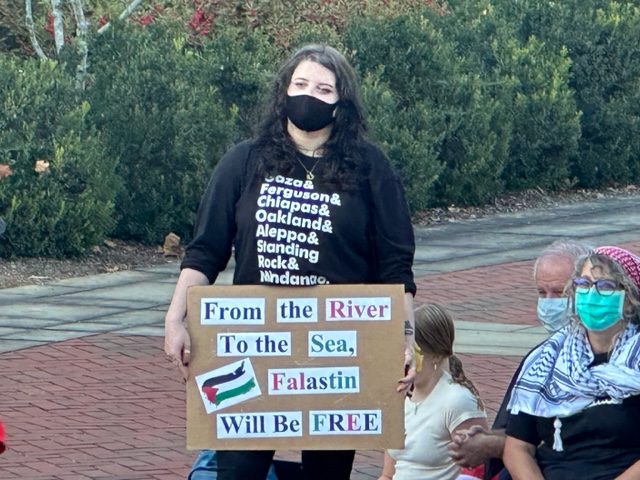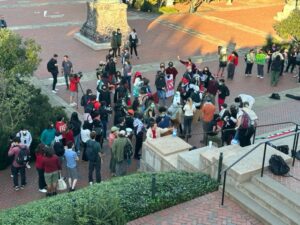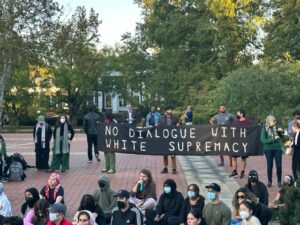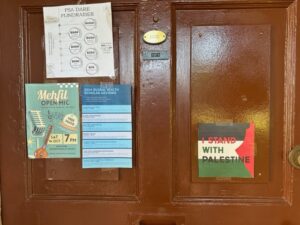
by James A. Bacon
A week ago the Students for Justice in Palestine at UVA created a furor by publishing a statement defending Hamas’ attack on Israel. “Yesterday’s rebellion was not ‘unprovoked,’ as many have claimed, but is the consequence of years of mass killings, ethnic cleansing, and oppression from Israel,” the group wrote. “The events that took place yesterday [October 7] are a step towards a free Palestine…. We stand in solidarity with Palestinian resistance fighters and all oppressed people around the world seeking freedom and a better world.”
The same group organized a demonstration yesterday at the steps of the Rotunda in the shadow of the statue of Thomas Jefferson. I made a point of attending to hear what the protesters had to say and observe what transpired. I had one major question: who were these people? What kind of person living in a free society could defend the atrocities perpetrated upon Israeli civilians of all ages? What could they possibly be thinking?
As executive director of The Jefferson Council, which is dedicated among other things to free speech and free inquiry at UVa, I supported the right of the pro-Palestinians to hold their rally and make their case. But the Council also stands for viewpoint diversity, which is under threat from the steady leftward drift of the faculty and staff and the slow extinction of professors openly professing conservative, libertarian and independent views. While the far left is a distinct minority at UVa, it is a highly vocal and influential one. How representative, I wanted to know, were the Students for Justice in Palestine at UVA?

Students for Justice in Palestine begin to assemble Thursday at the foot of the Thomas Jefferson statue.
The rally, I would guess from eyeballing it, attracted a crowd of roughly 200. There were Palestinians, of course. There were others of apparent Middle Eastern descent. There were African-Americans and Whites, and there were others from the leftist ideological fringe such as transgender activists. The leader of the Students for Justice in Palestine acknowledged during his remarks that he himself was Jewish. (According to Townhall the leader of SJP is Josh Rosenberg, an undergraduate student majoring in Women, Gender, and Sexuality studies.) I recognized one individual who had asked combative questions at the Abigail Shrier event the evening before, and I had a brief exchange with another individual, a tall, broad-shouldered person with obvious xy chromosomes who had long hair and appeared to be growing breasts. (He asked me politely to move to a different spot.)
The event was peaceful. Attendees were admonished to “treat everyone with respect, even counter-protesters.”
The organizers presented a series of speakers. Rosenberg, or the masked leader of the rally whom I take to be Rosenberg, was at pains to stress that his group is not “anti-Semitic.” It is antizionist, meaning it opposes the Jewish state. He mourns the loss of life “without exception,” presumably referring obliquely to the more than 1,000 Israeli dead from the Hamas incursions, but he was there to “share sympathy with our Palestinian brothers and sisters.” The Students for Justice in Palestine, he said, gathered “in the spirit of peace, love and solidarity.”
The main theme of the rally was the victimization of the Palestinian people, beginning with the settling of European Jews in the province under British governance before World War II, the granting of Israeli independence in 1948, the war between Jews and Arabs, and the subsequent displacement of some 700,000 Palestinians known as the Nakba. Thousands of Gazans have died in military reprisals. The Israeli blockade of Gaza severely restricts civilian access to food and medical supplies. Gaza was described as “the world’s largest open-air prison.” The wall blocking free transit between Gaza and Israel was called “the apartheid wall.”

Antizionism merges with anti-racism. Pro-Palestinian protesters hold banner declaring, “No dialogue with white supremacy.”
The Students for Justice narrative was suffused with leftist vocabulary. For instance, the Jews of European descent were “colonists” and “settlers.” (No mention of Jews of Middle Eastern or African descent.) And appeals were made to marginalized and victimized people of color, especially African-Americans, in the United States. The rhetoric was similar to that of Black Lives Matter, which opining upon Hamas’s actions, declared, “We see clear parallels between Black and Palestinian people.”
There is no question that the Palestinian people have endured great suffering. However, much was omitted from the victimization narrative, which attributed all ills to the Israelis. Speakers made no acknowledgement of the rampant corruption of Palestinian leadership or Hamas’ diversion of humanitarian resources to military uses. While invoking history, speakers never alluded to the invasions of Israel by neighboring Arab states, the incessant rocket bombardments and terrorist incursions, or the words of Hamas’ own charter demanding the end of the Israeli state. There was no recognition that the carefully planned and executed killing, raping, and beheading of non-combatants confirms fears that a Hamas victory will result in a second Holocaust and extermination of every Jew in Israel.
So, back to my question: How many UVa students, faculty and staff did the pro-Palestinian protesters represent?
Friends and sympathizers of Israel had held a well-attended vigil two days before in the amphitheater, and President Jim Ryan had issued a statement condemning “the actions of Hamas and the horrific violence that has taken place against civilians, including children.” So, clearly, many Wahoos were appalled by the Hamas terrorism.
Even as the pro-Palestinians were gathering on the north side of the Rotunda, life went on as normal on the south side. As the sun fell in the sky and the shadows lengthened on a pleasant October day, a group of 20 or so people were being conducted on a tour. Students were socializing under the colonnades. A man seated in a lawn chair on the Lawn was singing soft-rock songs.
 Against that, we hear by way of Fox News that an anthropology professor had offered students extra credit for attending the rally. I also saw pro-Palestinian signage on the doors of two or three Lawn residents. And it was only last year that Student Council gave serious consideration to a resolution calling upon UVa to sever ties with speakers and groups associated with Israel. That campaign, according to the Washington Free Beacon, was initiated by Dissenters, a group that organizes college students to fight “war mongering elites” and “uplift” people “who are surviving under oppression.”
Against that, we hear by way of Fox News that an anthropology professor had offered students extra credit for attending the rally. I also saw pro-Palestinian signage on the doors of two or three Lawn residents. And it was only last year that Student Council gave serious consideration to a resolution calling upon UVa to sever ties with speakers and groups associated with Israel. That campaign, according to the Washington Free Beacon, was initiated by Dissenters, a group that organizes college students to fight “war mongering elites” and “uplift” people “who are surviving under oppression.”
Given the massive news coverage of the Hamas invasion, the social media publicity the pro-Palestine rally received, and the denunciations by Virginia Republican politicians from Governor Glenn Youngkin to Attorney General Jason Miyares and House Speaker Todd Gilbert, which ordinarily would inflame progressive students to action, I was surprised by the modest attendance.
Clearly, there is an active core of militant students at UVa — they include the 100 or more transgender advocates who protested the Abigail Shrier event two nights ago — who are vocal, visible, and have a dominating presence on the Grounds. But defending the Palestinians who terrorize Israeli grandmothers and behead Israeli babies is not a cause that many at UVa are willing to openly embrace.
James A. Bacon is executive director of The Jefferson Council. This column is republished with permission from the Jefferson Council blog.


